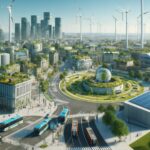In Milan, two residential buildings have been transformed into true vertical gardens – 900 trees and 5,000 bushes grow here, and in Seoul, a riverbed has been restored on the site of an old road. Building truly sustainable cities is one of the greatest global challenges of the 21st century. The United Nations expects the proportion of people living in cities to increase by 20% by 2050.
According to analysts, by 2050 the world’s population will increase from 7.5 billion to 9.5 billion people. At the same time, the number of people living in cities will also increase. Most of the urban growth will be concentrated in developing countries, but many developed countries will also experience an increase in the number of urban dwellers, especially in large cities. And how this urban population growth proceeds will determine not only the physical character of cities, but also our ability to live healthy, peaceful and prosperous lives.
Urban areas are where all the impacts of environmental change will be felt most acutely. Climate change floods and strong heat waves are already affecting cities. Making design decisions that increase resilience in urban environments can help us better manage the full impact of environmental disruption. Successful decisions require a fundamental rethinking of how we perceive cities. This means that we should perceive any city as an ecosystem, and not consider separately soil, trees and rivers in an urban setting.
In a recent publication, the Scottish Wildlife Trust has proposed a new approach to design called “green urbanism,” which seeks to reinforce the natural foundations of cities to help create beautiful places where people and nature can coexist. Conservation and improvement of nature in cities can bring many benefits to people – people will feel better, they can reduce the risk of floods, get cleaner air and water, expand domestic economic investment and increase life expectancy. Ecological urbanism seeks to fully realize all the benefits of living together with nature and the development of parks, gardens, rivers, the creation of green roofs and walls in urban infrastructure. But ecological urbanism is not just about creating green spaces within an urban area. It is about integrating green infrastructure into the buildings and streets of modern cities.



